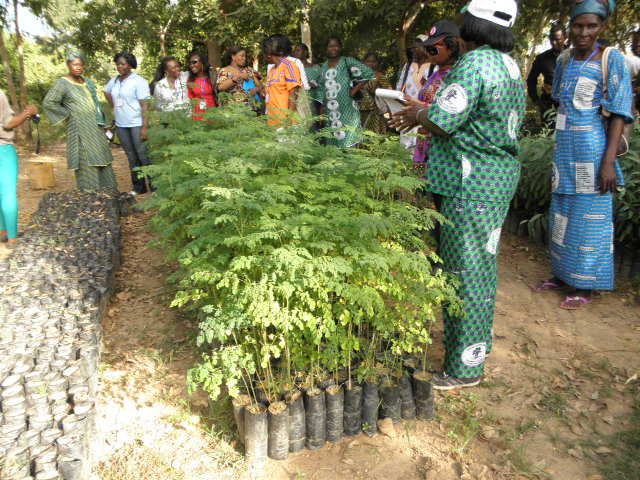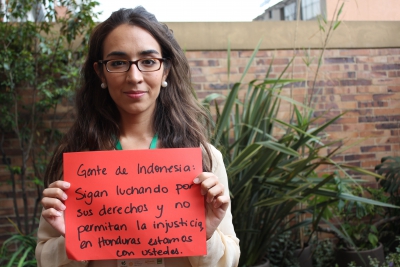By Stephanie Ratté (March 12, 2015)
Roughly 70 percent of women in Cameroon live in rural areas, relying at least in part on natural resources like forests for their livelihoods. However, women often face particular challenges in accessing the forests they need. Differences in the ways men and women understand and use forests mean natural resource policies can result in significant gender-differentiated impacts that oftentimes put women at a disadvantage. Women’s lack of secure access to forests can lead to a variety of inequities, including limited decision-making power; more vulnerability for women who are unmarried, divorced, or widowed; and greater likelihood that forest conservation schemes like REDD+ (Reducing Emissions from Deforestation and Forest Degradation) will not benefit women and men equally. As new programs seek to tackle deforestation in Cameroon, it’s imperative that these initiatives are not blind to gender differences in forest use and access. Cécile Ndjebet, a partner of WRI’s Governance of Forests Initiative, is a leading voice on gender and forest governance, both in Cameroon and internationally. Ndjebet serves as the director of civil society group Cameroon Ecology, coordinates the National Civil Society Organization Platform on REDD and Climate Change and heads the African Women’s Network for Community Management of Forests (Réseau des Femmes Africaines pour la Gestion Communautaire des Forêts or REFACOF). I recently caught up with her to talk about the challenges rural, forest-dependent women face in Cameroon, as well as solutions for overcoming these problems.
1. Why is it important for women to have secure access to forests in Cameroon? When women have clear and secure rights to forest land and resources, they are more likely to be able to access credit and technical assistance, manage resources sustainably, and are less dependent on marriage for security. Research on the link between gender and natural resource management demonstrates the critical and positive role that women can play in achieving environmental and development goals. In Nepal and India, for example, studies demonstrate that greater participation of women in forest management and decision-making processes at the community level are associated with better forest conservation.
2. What are the main challenges you face in your work? One is building the capacity of the government and other groups to recognize the importance of gender equality. I recently attended a workshop in Brazzaville and realized that people rarely understand why gender is important to consider in forest and natural resource management. Awareness is being raised now because of initiatives like REDD+. But we also need the political will of governments, greater capacity of civil society organizations and more resources for effective advocacy.
3. How can REDD+ help bring greater gender equity to natural resource governance in Cameroon? The government of Cameroon began developing its national REDD+ strategy in June of 2014 in order guide the implementation of incentives for the sustainable management of forests and the conservation and enhancement of forest carbon stocks. Cameroon Ecology is playing a key role. So far, the government is open to our participation, and we are working to gather real information from communities and villages so that the contributions of rural women and men can be inserted in the national REDD+ strategy. We also need to ensure that REDD+ programs implement safeguards to avoid creating or exacerbating gender inequalities. What I see in REDD+ is that it is a good opportunity. We don’t yet know exactly what we will get with carbon offsets, but the REDD+ process has created a more inclusive space for promoting the equitable management of resources. I always say to the communities: If REDD+ cannot bring the scale of resources we hope for, at least it can help strengthen participation and improve natural resource laws and regulations for rural men and women in Cameroon.
4. How is your organization working to build capacity to address gender-related challenges? We are conducting trainings with other NGOs on gender and REDD+. We have just finished three training sessions to help men and women understand how gender is important to natural resource management, especially in relation to climate change and REDD+. We have also developed a policy brief on women’s participation in Cameroon’s REDD+ experience. In Cameroon, we are also coordinating the National Civil Society Organization Platform on REDD and Climate Change, a venue where I have been able to influence how women participate in decision making. The platform was established in 2011 to enhance collaboration on REDD+ and climate change issues between civil society in Cameroon and the government. We now have women represented at local, district and national levels of the platform’s governance. We also succeeded in getting gender focal points in at least eight ministries dealing with natural resource management. But there is still progress that must be made. The important point is to ensure that women are not just present in meetings, but that they can actually influence decision-making processes. The work we’ve done is a starting point, but we need to increase awareness, capacity and resources. By strengthening women’s networks and partnering with men so they can be advocates for gender equality, we can make it clear that inequitable situations are not favorable for any kind of development.
5. How does access to information factor in? Information and communication are challenges. It can be difficult to reach rural communities in Cameroon because many of these areas lack electricity. In rural areas, most people—especially women—understand the local language, rather than French or English. If you want to be effective, you have to translate information into the local language, so we recognize that this can be a significant limiting factor in our work. Capacity to understand forest governance and gender issues is another barrier. We need to produce documents that are nontechnical, affordable and accessible. Within the REDD platform, we are building partnerships with rural radio stations and media at the district level. The advantage is that most of the villages do have access to radio. Next year, we intend to expand partnerships with rural radio programs to publish and transmit information to a larger audience.


